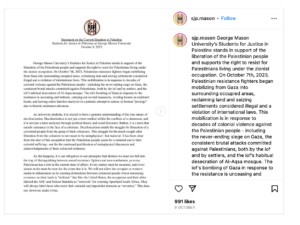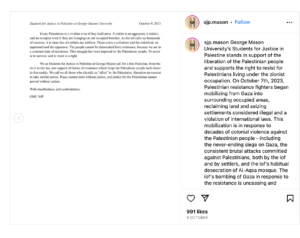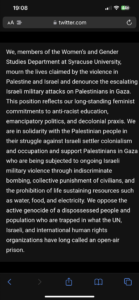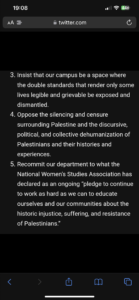Despite what the media and loudmouthed activists on both sides would have you think, there are multiple kinds of Zionism and anti-Zionism. Some are worse than others. This isn’t a scientific study; it’s based on my observations as an armchair analyst of the situation. I’ll order them from one extreme (eliminationist Zionism) to the other (eliminationist anti-Zionism).
Zionists
Some Zionists want to wipe out all Palestinian Arabs from Israeli territory and ensure that the entire Land of Israel is reserved for Israeli Jews. Prime Minister Netanyahu and his coalition clearly fall into this category. This kind of genocidal Zionism is to be condemned. It is these Zionists who exemplify settler colonialism, since it is their goal to displace all Palestinians, who are merely an obstacle to their version of Manifest Destiny. They are typically Islamophobic and associate Muslims with terrorism, even though most Muslims are peace-loving, just like anybody else. They have forgotten, like their extremist anti-Zionist counterparts, that both Jews and Arabs are native to this part of the Middle East. Rightists with identitarian politics (those who treat certain races, genders, religions or nationalities as virtuous or damned, no in-between) often hold these views—well, except for neo-Nazis and other antisemites, unless they want to deport all diaspora Jews to their own Bantustan.
Other Zionists will allow Palestinians to live, but only in squalid apartheid conditions. This was the status quo in Gaza for several years, even after the Israeli government claimed it would disengage from Gaza in 2005. This kind of Zionism is also to be condemned. These people typically want Judaism to be the state religion. Like the genocidal Zionists, segregationists are Islamophobes and think that keeping people in an open-air prison for 16 years is an acceptable way to fight terrorists—even though a large portion of the Gazan population is children and adolescents. They typically support the West Bank settlements.
And other Zionists are against the apartheid system and Netanyahu’s genocide, but they still prefer to maintain a single Jewish state in which Palestinians are not afforded the same rights. They may or may not support the West Bank settlements. This kind of Zionism is also to be condemned, since it is a mirror image of Middle Eastern Jews’ experiences as dhimmis (a protected but subordinate group) under Islamic rule. These Zionists are probably worth having a dialogue with, since they are opposed to the obvious crimes against humanity committed by the Israeli state.
Some Zionists support the existence of the state of Israel, but they are open to a two-state solution or something else based on the wishes of both Israelis and Palestinians. They generally want to end the occupation of the West Bank and the apartheid regime in Gaza. Like the single-state Zionists, two-state Zionists are worth having a dialogue with. Most western governments fall into this category. The problem arises is when two-state Zionists try to appease the more extreme factions, which some of them do.
Anti-Zionists
Some anti-Zionists want to end the West Bank occupation and apartheid system and want a single secular state that includes both Jews and Arabs. Zionists are often opposed to this solution because it would create a Palestinian majority and dilute the Jewishness of Israel—and possibly open its residents to the antisemitism they escaped in Europe and in the Arab states before the establishment of the Israeli state. (This can probably be circumvented with laws explicitly protecting Jews from antisemitism and honouring the history of the Israeli state, even if it is now secular, as well as quotas for Jewish and Arab representation.) This group of anti-Zionists is usually worth talking to. This flavour of anti-Zionism is common among some leftists, typically Marxists. A variant of this view is anarchists’ anti-Zionism, which opposes both Israeli and Palestinian nationalism—and the existence of any states, regardless of the ethnicity or religion associated with them. Some of these anti-Zionists may support the uprising in general (and show a disturbing lack of regard for Israeli civilian deaths), though they usually disapprove of Hamas’s theocratic beliefs and desire to wipe out all Jews in the area.
Other anti-Zionists want a single state whose official religion is Islam, though they will allow Israeli Jews to remain on the territory. This would be a return to the dhimmi status to which Jews were subjected before the creation of the Israeli state. These anti-Zionists are possibly worth talking to, though their desire for a theocracy means that they are less likely to be reasonable than supporters of a secular state.
And finally, there are anti-Zionists who want to dismantle the state of Israel and kill or deport all the Jewish residents to establish an Islamist Arab ethnostate. This is the view held by Hamas, Hezbollah and some other Islamist groups, as well as some “decolonial” supporters who (wrongly) liken Hamas’s terrorist acts to those by Nelson Mandela’s African National Congress and other resistance fighters. (The currently jailed Marwan Barghouti is a better analogue to Mandela.) Unfortunately, this group of anti-Zionists tends to dominate the conversation, and they really shouldn’t. Leftists with identitarian politics (the lefty version of right-wing fascism or religious fundamentalism) can fall into this category. I find this group the most offensive since they claim to speak in the name of social justice and fairness, but they’re advocating wanton violence and defending terrorists who slaughter civilians instead. I expect right-wing Zionists to be heartless, but not people who are supposedly on “my side.” The sad thing is some tankies—yes, the ones who stuff their articles with quotes from Stalin and praise North Kor—I mean, the “DPRK,” as many times as they can—have been more reasonable than the identitarians. Tankies at the very least usually reject Islamism, even if they frequently fail to condemn Hamas’s killing of civilians. Identitarians don’t give a shit about theocracy if it’s not Jewish or Christian. The idea that a religious or ethnic group can be an oppressed minority in the West and an oppressive majority in the Middle East has not occurred to them. They also tend to see Jews, regardless of race, as white settlers who have displaced native Arabs, even though a plurality of Israeli Jews have ancestors from the Mediterranean or Middle East. They outnumber Ashkenazi Jews, though in Western countries, Jews are typically associated with Ashkenazim because of 19th- and 20th-century immigration patterns. (I spend more time criticising this group than any other because I am surrounded by identitarian leftists who spout this antisemitic genocidal bullshit. I don’t know any Zionists who are calling for a genocide, just progressive Zionists who want equality for both Israelis and Palestinians, as well as the other ethnic groups living in Israel/Palestine.)
The Woke Contrarian’s Views
I lean toward the (preferable) two-state solution or (less ideal) a single secular state. Either is better than the current situation or anything else Jewish or Islamic theocratic nationalists are proposing. Unfortunately, the Israeli regime and Hamas are pushing the worst possible solutions—singular, monoethnic, theocratic states with no room for compromise or coexistence.





